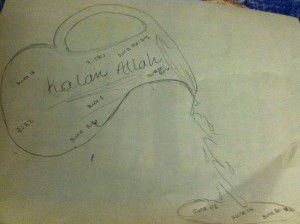Week 5
Scripture
You moon-faced lovers
Dedicated as you are
Sovereign in your spirit
Yet bound in your spirituality
You moon-faced lovers
Birds of the night
Gales of His majesty
Your wings spread your faith
You moon-faced lovers
Martyrs in your own right
Mothers of sacrifice
Pregnant with selfless desires
You moon-faced lovers
Roses you are, thorns adorning your stems
Merely displaying the pedals of God
Arranged in a garden of elevated spirits
You moon-faced lovers
There is one place for you
In the moon light
Lit by a reflection, a grand one
Muhammad is often seen as the moon, whose light is merely a reflection of the sun’s. In this case, that “sun” would be God, the merciful. In the beginning the first creation that God created was Nur Muhammad, “the light of Muhammad”. This light had not source other than God, Himself. Muslims recognize that Muhammad had no powers of his own but was merely a vehicle and a vessel through which God could work, and for that reason, God loved him.
The month of Ramadan is a month that Muslims hold very dear for several reasons. For one, it is the month during which the first revelation of the Qur’an was sent to Muhammad. Also during this month the martyrdom of Hussein took place. Thus, throughout the Islamic world there are reenactments of what exactly transpired on that day. Many hold it in deep reverence.
The poem I wrote is meant to reflect on what occurred through a means other than theatre and reenactments. It focuses a lot on the aspects of the story that we read this week, concerning the nature that was constantly alluded to. The moon was a major image that was mentioned and so I made that a central focus in my poem. The moon represents Muhammad and the vessel that he represents. We are all vessels through which we must emanate the love of God. In the Qur’an He says, “Heaven and Earth cannot contain Me, but there is room for Me in the heart of the believer”. I titled it “The Scripture” because it is believed that all of God’s creations, including all aspects of nature, are part of his nature. Thus, though another vessel is lost in Hussein there are the others including his wife, daughter, and sister that can carry on that role. However, martyrdom is considered to be an elevated state of spirituality which I believe is portrayed through my poetry. What Hussein is doing is meant to serve as an amplified message of God’s glory.

